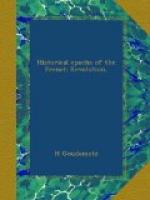“THE ratification by the French people, which Louis demands, “is the exercise of a natural and sacred right which belongs to “every person accused; it is the right of every man, and “consequently of Louis. If we did not prefer this claim in his “defence, it was because it was not in our power to foresee that the “National Convention would resolve upon judging him; or, if it did “judge him, that it would condemn him. We now learn, that the fatal “decree, which condemns Louis to death, has been carried by a “majority of five votes only. Permit me, Citizens, to represent to “you, in the name of humanity, in the name of that sacred principle “which calls for every mitigation in favour of the accused, that this “circumstance, so very extraordinary, may well engage you “voluntarily to accede to the proposed ratification. I demand it in “the name of justice, in the name of our country, in the name of “humanity. Exercise your own high powers; but do not astonish France “by the exhibition of a judgment that must appear terrible, when the “surprising minority comes to be considered.
“Citizens, permit me to adjure you once more in the name of “Louis XVI. and to conclude with suggesting to you, whether, whilst “you are contending for the security of the nation, and its real “interest, you will not tremble, when you reflect, that the safety of “the republic, the Security of the French empire, and the happiness “of 25 millions of people, may possibly depend upon five votes.”
******
FOURTH APPEL NOMINAL.
THE object of this fourth appeal was to know whether the execution of Louis might be deferred; 310 were for respite, and 380 against it. Thus, by a majority of 70 votes, it was decreed, that the sentence against Louis XVI. should be executed without delay.
******
THE EXECUTION OF LOUIS XVI.
21st JANUARY, 1793.
THE minister of justice and the heads of the administrative corps, having proceeded to the Temple on Sunday the 20th of January, about four in the evening, notified to Louis the warrant for his execution. “I demand,” said the King, “a respite of three days to “prepare myself for appearing before God. To assist me in this work, “I desire to have Mr. Edgeworth, (an Irish clergyman) with whom I may “freely communicate. I desire that he may be secured from all “uneasiness, or apprehension, on account of this charitable office “which he shall perform for me. I desire to be relieved from that “perpetual watch which the council-general has set over me for some “days. I demand in this interval the privilege of seeing my family “when I shall desire it, and without witnesses. I could also wish, “that the Convention would, as speedily as may be, set about “determining the fate of my family, and permit them to see each other “freely and commodiously, when they shall think proper.
“I recommend to the liberality of the nation all those persons who “have been attached to me. Among my pensioners there are many aged “men, women, and children, who have no other means of subsistence.”




